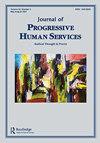进步时代的社会工作与矫正:我们记得什么,我们看不见什么
IF 0.8
Q1 SOCIAL WORK
引用次数: 0
摘要
摘要摘要美国的社会工作职业是在警察和惩教专业化的同时发展起来的。社会工作者被认为是最早的女警察、缓刑监督官和青少年管教所负责人。尽管如此,我们在进步时代美国历史上与矫正的专业关系仍然没有得到充分的探索和理解。这段纠缠的历史是如何逃脱美国大多数专业化社会工作的叙事的?这篇综合文献综述探讨了社会工作学者讲述的关于进步时代(1890–1930)社会工作与矫正的关系的故事。调查结果调查了17篇同行评审的社会工作文章,我确定了社会工作如何记忆和模糊我们与修正的进步时代关系的主题。文章讲述了犯罪、社会控制和进步的故事,同时掩盖了监狱工作、看守和惩教领导的历史。应用社会工作对二十世纪初矫正的专业记忆对当今的政策、研究和教育产生了重大影响。宏观层面的从业者可以从早期“改革者”设计和实施的渐进式改革中学习,这些改革扩大了尸体控制的范围。需要进一步的研究来探索社会工作的矫正历史,尤其是监狱工作。这可以采取档案研究和口述历史的形式。本文章由计算机程序翻译,如有差异,请以英文原文为准。
Social Work & Corrections in the Progressive Era: What We Remember, What We Obscure
ABSTRACT Summary The social work profession in the US developed alongside and within the professionalization of policing and corrections. Social workers are credited as some of the earliest policewomen, probation officers, and juvenile correctional facility superintendents. Still, our professional relationship to corrections in Progressive Era US history is underexplored and uninterrogated. How does this entangled history escape most narratives of professionalized social work in the US? This integrative literature review explores the stories social work scholars tell about social work’s relationship(s) to corrections in the Progressive Era (1890–1930). Findings Surveying 17 peer-reviewed social work articles, I identify themes of how social work remembers and obscures our Progressive Era relationship with corrections. Articles tell a story of delinquency, social control, and progress while obscuring the history of prisonwork, wardenship, and correctional leadership. Applications Social work’s professional memory of corrections in the early twentieth century has significant consequences for policy, research, and education today. Macro-level practitioners can learn from progressive reforms, engineered and implemented by early “reformers,” that widened the net of carceral control. Further research is needed to explore social work’s correctional history, prisonwork in particular. This may be taken up in the form of archival research and oral histories.
求助全文
通过发布文献求助,成功后即可免费获取论文全文。
去求助
来源期刊

Journal of Progressive Human Services
SOCIAL WORK-
CiteScore
3.20
自引率
8.30%
发文量
14
期刊介绍:
The only journal of its kind in the United States, the Journal of Progressive Human Services covers political, social, personal, and professional problems in human services from a progressive perspective. The journal stimulates debate about major social issues and contributes to the development of the analytical tools needed for building a caring society based on equality and justice. The journal"s contributors examine oppressed and vulnerable groups, struggles by workers and clients on the job and in the community, dilemmas of practice in conservative contexts, and strategies for ending racism, sexism, ageism, heterosexism, and discrimination of persons who are disabled and psychologically distressed.
 求助内容:
求助内容: 应助结果提醒方式:
应助结果提醒方式:


